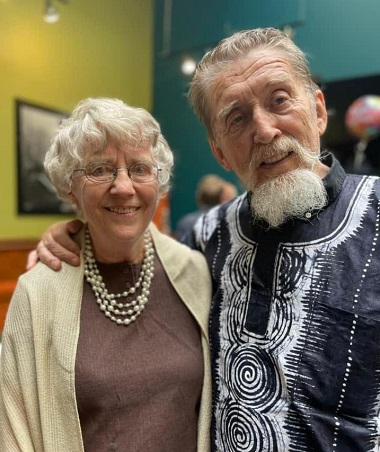
Fran and Jan Boer raised their family in Nigeria and now live in the West End: “When we look in our mirror, we see missionaries.”
Every Square Inch. It is the name of Jan and Fran Boer’s new book – and a guiding principle throughout their lives.
After leafing through several pages of commendations from high-ranking Nigerians, one comes to the quote by Abraham Kuyper, from which the title is taken:
There is not a square inch in the whole domain of our human existence over which Christ, who is sovereign over all, does not cry, ‘Mine!’
Jan and Frances (Fran) Boer are now settled in Vancouver’s West End, but they were already living out their views during their 30 years in Nigeria.
At 450 pages, Every Square Inch covers a lot of ground; I will not be able to do much more than give a sense of the book’s scope.
Nigerian praise
Every Square Inch is “A Nigeria Missionary Memoir: 1966 – 1996” – and one cannot avoid being impressed by the number of leading Nigerians who have been happy to commend the Boers and their service to the nation.
Among them: Darius Dickson Ishaku, Executive Governor of Taraba State; Dr. Obadiah Mailafia, former Deputy General of the Central Bank of Nigeria and former presidential candidate for the African Democratic Congress; and Bishop Matthew Hassan Kukah, Catholic Bishop of the Diocese of Sokoto. There are several more.

Former head of state Yakubu Gowon wrote the Foreword for Every Square Inch.
Retired General Yakubu Gowon (head of state from 1966 – 1975, later professor of political science at the University of Jos) wrote the Foreword. He said:
I have always admired Christian missionaries. They are those men and women who make incredible sacrifices for the sake of sharing the transforming Gospel of Jesus Christ with a world desperately in need of it.
For the rest of us, the sacrifices they make are often difficult to comprehend. This is the path Jan and Fran chose at very young ages. It was a choice that would lead them from the comforts of the Western world to Northern Nigeria, the part of my country where I come from . . .
It is good to hear that message from an African leader, who grew up under a colonial regime. Missionaries are often dismissed or even despised in the West. That was my view as a young man, before, by God’s grace, I was saved on a farm owned by missionaries in Zambia and then taught under missionaries to Europe at L’Abri in Switzerland. While there, I met my wife Margaret, the daughter of missionaries to Japan. Even at most churches today, missions and missionaries don’t receive the support they deserve.
Agents of reconciliation
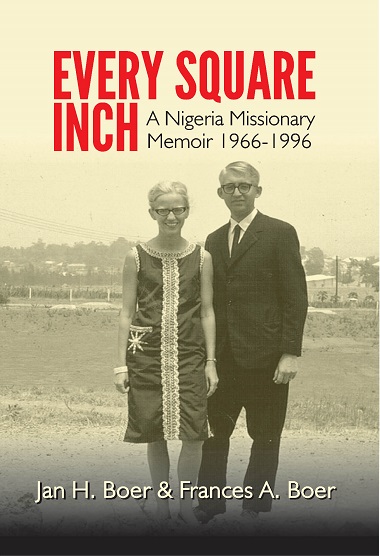 Every Square Inch is, unrepentantly, a book by missionaries:
Every Square Inch is, unrepentantly, a book by missionaries:
The first thing that needs saying is that we were and remain proud of being missionaries. This is a class of people often berated and demonized by many elements of society. We expect that, for even the Bible predicts that for us. No problem. It slides off our backs like water.
In the meantime, we have been instrumental in establishing Christian churches the world over and have spread a Christian worldview that is operative in various ways everywhere, often without people recognizing or acknowledging its source.
Modern notions of human rights, democracy, equality, including that of women, would not have gained ground without the combination of Christianity and its rebellious child, Humanism. We’re part of that messy process and proud of it.
Above all, we have been agents of reconciliation between the fallen human race and God; we have contributed to the salvation of the world and of individuals. We have spread joy and liberation. We’ve done it imperfectly as we humans do everything imperfectly, but we’ve done it.
Missionary presence
The missionary presence in Nigeria was considerable by the time the Boers arrived. Their mission, the Christian Reformed Church (CRC), counted more than 80 paid missionaries, not including spouses and their families. That number declined dramatically during their 30 year stay.
Missionary influence in Nigeria is surprisingly recent. They became well established in the south of Nigeria during the 19th century, and moved into the Middle Belt of the Northern Region in the early 20th century, under strict colonial control. The British Sudan United Mission (SUM) provided an umbrella for the various mission groups:
The SUM policy was to establish churches independent of mission control, raising their own funds and led by indigenous clergy. They completely succeeded in this. Their hope was that one united church would eventually emerge from these efforts, but here they did not succeed.
This reality leads to some of the less felicitous passages in a book which is in general very reader-friendly. For example:
The CRCN did not start out under that name. They started out as ‘EKAS Benue,’ with ‘EKAS’ indicating its membership in TEKAS, an earlier designation of TEKAN, while ‘Benue’ refers to the river . . .
Critique
Having spoken warmly of the missionary enterprise, Jan certainly didn’t hesitate to critique or question many of its practices on the ground:
- He was completely unprepared for spiritual warfare when called upon: “I felt ignorant, impotent and powerless. I suddenly became angry at our training and at our Western secular worldview . . .”
- Asked by Christian political leaders to offer some insights and Bible studies related to their work, he was forbidden by his mission: “I cannot imagine a missionary organization disappointing its host community more, not to say ‘betraying.’ The church of the ‘every square inch?’ Of Christianity for all of life?”
- Surprisingly, many missionaries had little daily contact with Nigerians: “In short, they were too confined in their comfort zones.”
- During a talk to MCC workers about northern Nigeria: “I explained the capitalist and soft-secular heritage of most missionaries in Nigeria and how they tended to basically support colonialism, apart from certain obvious immoral and anti-Christian policies. They did not have a comprehensive Gospel with which they would address all of culture and life.”
- In his writing, including this 1981 dissertation summary: ‘Missions: Heralds of Capitalism or Christ?’
Every Square Inch
Jan described what motivated them in Nigeria:
We have a particular take on missions that some people will recognize immediately from the title: Every Square Inch. That is a famous term from Dr. Abraham Kuyper, former prime minister of the Netherlands, who insisted that the Lord Jesus Christ has dominion over the entire world, over every square inch. Our mission was geared to make that the overall vision for the Nigerian Christian community where we served.
Rev. Dr. Yusufu Turaki, professor at Jos ECWA Theological Seminary and National Vice President of Christian Association of Nigeria, endorsed the book, saying Boer introduced him to Reformed theology:
Jan Harm Boer remodelled my theological life. I came from an SIM/ECWA background with a heavy dosage of American Fundamental-Evangelicalism. . . . I can sum up our activities in Jos and Nigeria at large as ‘Christian Social Activism.’
Jan said he often experienced a “Kuyperian restlessness.” He wrote, for example, of a time when he had been asked to lead a course with 250 Baptist pastors:
I did not fly the Reformed flag and did not critique their tradition except by implication. They were excited at my Biblical teachings and argued with none of it. That had become my experience in other places as well. It is, I believe, because my holistic emphasis feeds into the traditional African holistic worldview that has been undermined by missionaries.
Now they found it back in a Biblical way. It excited them and led many of them to ask me why they had not heard this emphasis before. . . .
Jan admitted that he has sometimes spoken up with impatience towards other missionaries, though he felt it was often justified because “a mission is not a debating society.” Missionaries, he insisted, need to be united in their “basic perspectives and goals,” but often were not.
Muslims and Christians
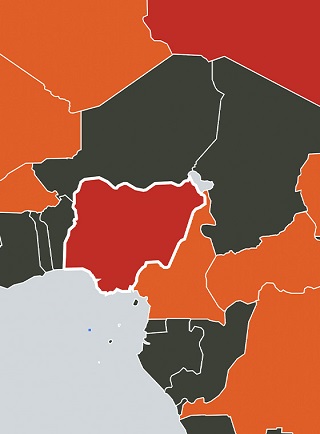 We have all heard stories about Muslim persecution of Christians in Nigeria. Open Doors’ 2023 World Watch List ranked Nigeria as #6 on its annual ranking of the 50 countries where Christians suffer very high or extreme levels of persecution and discrimination for their faith:
We have all heard stories about Muslim persecution of Christians in Nigeria. Open Doors’ 2023 World Watch List ranked Nigeria as #6 on its annual ranking of the 50 countries where Christians suffer very high or extreme levels of persecution and discrimination for their faith:
Christians continue to be brutally attacked in Northern Nigeria. Boko Haram, ISWAP, Fulani militants and other armed bandits have conducted devastating raids on Christian communities. The government continues to deny this is religious persecution, so violations of Christians’ rights have been carried out with impunity.
5,621 Christians killed
5,621 Christians were killed for their faith last year. 90 percent of these were from Nigeria alone. The huge increase in violence in Nigeria and Sub-Saharan Africa has caused more Christians to lose their lives in the last 5 years. Christians killed in 2023 numbered 80 percent more than five years ago (3,066).
The Boers are very concerned about the situation, though they know first hand that things are not as simple as they seem from overseas.
Boer said the population of Nigeria is made up of roughly 90 million Muslims, 90 million Christians and 20 million animists: “It is the only country in the world where the world’s two dominant evangelical religions represent two such equally massive blocks. I consider it a unique laboratory for Christian-Muslim relations.”
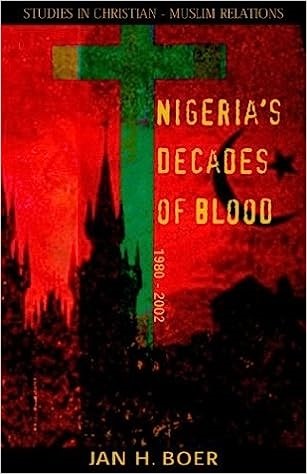 Following are a few excerpts from Every Square Inch which offer a sense of how intractable the issues are:
Following are a few excerpts from Every Square Inch which offer a sense of how intractable the issues are:
Islam already had a staunch grip before the advent of missions in what today is often referred to as ‘far North’ or ‘core North’ for many centuries and had placed a firm stamp on the culture. The hostility that exists today between the two religions in the North has its beginning in the pre-colonial Muslim invasions into former animist areas to capture slaves. . . .
It was brutal and left destruction in its wake year after year. The colonial regime did not allow missions to work in that core Muslim area, breaking the myth that in Africa, Christianity and colonialism were one and the same.
Missions had to await independence before they gained access there, but by that time it was mostly Nigerian evangelists who would go there. . . .
Jan added:
There was also the contempt of Muslims for Christians as former animists, and at the same time, on the part of the emerging church, a kind of inferiority complex with its new and hesitant Christian faith that still needed further fleshing out for them.
Some Muslims have been won to Christ (“The claim of many that it is next to impossible to lead Muslims to Christ certainly does not hold in Nigeria, where there were and are thousands of converts”), but working with those converts was often challenging.
Many have found it challenging to fit into the larger Christian community. Some proved not to have been serious in their new faith, while others reverted to Islam when they found they had lost secure livelihoods, being ostracized form their former communities because they had joined the Christians.
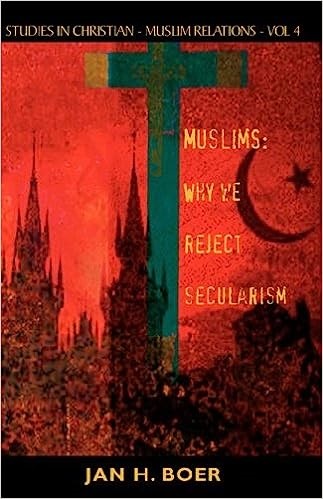 He quoted from one of his reports, in 1991:
He quoted from one of his reports, in 1991:
You may remember from an earlier letter that the Muslims brutally clubbed a new convert to death. We are now trying to bring the ‘regular’ church and this former Muslim group together at least enough so that church leaders will protect these new Christians against further violence. . . .
It may seem strange to you that such introductions are needed at all. The reason is that most Christians in the ‘regular’ mission churches are from ethnic groups that historically have been very hostile to the tribes to which these former Muslims belong.
It will take a great work of reconciliation on the part of the Spirit to have these people come to trust and accept each other.
These comments barely scratch the surface of the issue. Not only does Every Square Inch cover Christian-Muslim relations in some detail (both in terms of personal contacts and in theory), but Jan has written an eight-volume, 2,700 page (!) collection on Christian-Muslim relations.
In a letter, he wrote:
This project will constitute a witness to Muslims that the Christian Gospel is concerned with all of life. The upshot of many missions in Africa has been a very narrow Gospel separated from the realities of life, and Muslims have noticed that. . . .
Personal stories
The book is peppered with personal stories, of challenges at work, of successes and failures with local workers, of interactions with government officials, of daily trials with power outages and driving into rural areas.
Here is one glimpse:
We would visit Nyankwala one weekend a month and always stayed in the Lena compound. Thus we had a good opportunity to closely observe a Nigerian Christian family. It was impressive. People came and went. People from all over the village came to play.
Mealtimes were disciplined in Nigeria’s own way. The adult men would eat together; Naomi and other females in the compound would eat together and children would get their share as well.
In the darkness of the evening after supper, the entire compound would gather outside in the centre of the compound and have a family prayer – a Bible reading either by flashlight or candle, a few songs in Hausa or Jukun and prayers.
We observed that children were free to go to bed at whatever time they liked. There was not particular ‘bedtime’ at which they might be tucked in.
There are many stories; the reader will gain a sense of what daily life was like.
Family
The book, according to Jan, has three main targets: Nigerians, missiologists and people who want to know about their family: “Most readers are more interested in people than in missions and missionary theories.”
I’m not sure the combination will work for everyone, but I very much enjoyed reading Every Square Inch, despite not qualifying for any of the three target groups.
One reason the family sections make sense is that the bulk of the content of the book is based on letters home. While Jan wrote most of the book, the majority of the letters had been written by Fran. The Boers knew what they were missing by living in Nigeria and they were clearly determined not to lose touch with their families.

Wiebe Boer’s book was based on his PhD thesis.
Both Jan and Fran were born in the Netherlands to large families. Jan came to the west coast of Canada with his parents and siblings in 1951, spending his teen years in Port Alberni. Jan’s family settled in Michigan.
Both came from Christian Reformed families. They met at Calvin College, a CRC school in Grand Rapids, where Fran grew up. He trained at the seminary while she became a teacher. Neither had dreamed of missionary work, but were drawn to Nigeria by a speaker who told them of the need for ordained workers.
While in Nigeria, a local girl (Lydia) came to live with them, and they had three more children: Kevin, Cynthia and Wiebe. Lydia remains in Nigeria. The others appear to have thrived in Africa; all attended Calvin College and now live in North America.
Calvin has a unique place in the Boer family. Jan told me that an early relative was the first president of the school (now a university) – a position now occupied by their son Wiebe!
Following his time at Calvin, Wiebe earned two masters degrees and a doctorate at Yale University, then worked in economic development, management consulting, philanthropy and impact investing. For 12 years, he was in Lagos, Nigeria, most recently as CEO of All On, a renewable energy investment fund of Shell.
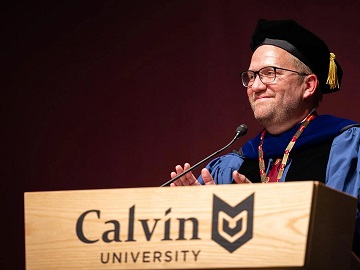
Dr. Wiebe Boer delivering his inaugural address. Photo: calvin.edu
When he delivered his inaugural address at Calvin last November, an online denominational report stated:
In his talk, Boer discussed his vision for Calvin to be a welcoming place for all to experience the powerful transformational impact of the university’s mission.
He told the story of his parents, Jan and Frances, coming to Calvin as immigrants, and he shared that he and Joanna (now his wife) came to Calvin from overseas with little legacy and little money – and he talked about how all of them found a place to belong at Calvin. He emphasized Calvin’s continuing to strive to be a welcoming place for its neighbors near and far.
“There are more Jans and Franceses starting this year, as there are every year. There are more Wiebes and Joannas too. And there will be for many years to come. Calvin is now appealing to more communities who face challenges to integration and social elevation in American society and beyond,” said Boer.
(Wiebe welcomed delegates to the CRCNA Synod 2023 at Calvin University this week (June 9 – 15).
Vancouver
After leaving Nigeria, the Boers lived in Grand Rapids, Michigan for five years. Since 2001 they have made Vancouver their home. Jan said, “We were officially retired, but hardly idle.”
To put it mildly. Here are some key achievements:
- Completing the eight-volume Studies in Christian-Muslim Relations series (described briefly above);
- Fran and Jan wrote a five volume memoir. Every Square Inch is a summary of two volumes – all available as PDFs here; Bookcraft in Nigeria published the hard copy of Every Square Inch.
- ORAL (Online Reformational Academic Library): extensive “references to economics, politics, history, art, philosophy, etc . . . an amazing wide range of Christian literature you probably never knew existed.”
Go to Jan’s Social Theology website for all of this and more. The ORAL content is interwoven throughout.
Jan and Fran have been part of First Vancouver Christian Reformed Church, but also First Baptist Church, which is quite close to their home in the West End.

Every Square Inch is available as a PDF: https://socialtheology.com/docs/6–Every_Square_Inch–MARCH_2022.pdf
Or as a hard copy, from Bookcraft in Nigeria: https://bookcraftafrica.com/single/view/228
We love you Jan and Fran. Please send us an order form for buying the book Every Square Inch.